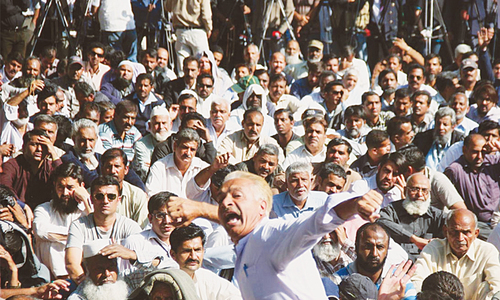PAKISTANI businesses perceive trade unions as a drag on growth, a redundant institution led by hooligans known for blackmailing the management, a legal burden impinging on their freedom, a regressive force against technological advancement and a tool in the hands of hostile political entities.
Experts warn of adverse consequences if trade unions are deprived of their role in growth and exports. They believe vibrant labour bodies are crucial for the defence of democracy and extending its gains.
“The world is watching. If the stories of the workers’ exploitation start spilling on social media, perpetrators will be dumped by their global suppliers and clients in the West. Besides, it’s stupid to dare the desperate,” a minder of labour affairs said privately.
“Recently, Germany passed a law not to trade with countries that defy global labour standards of guaranteeing a decent living for workers,” he said.
The Pakistani business class is aware of the Scandinavian capitalist model that has an exceptionally high trade union density (over 95 percent of the workforce is unionised). It admires their success but finds their attitude towards labour rooted in social advancement.
The government supports unionisation in theory, but the weak implementation of labour laws exposes the tilt of the legal framework towards employers
Privately, they admit that labour laws in Pakistan exist mostly on papers because of weak enforcement and availability of avoidance avenues. They still fight tooth and nail any pro-worker change in the legal framework. Tycoons resent the very concept of the minimum wage and see it as an unnecessary intrusion in their affairs. The recent upward revision in the minimum wage from Rs17,000 to Rs20,000 in three provinces and Rs25,000 in Sindh has been challenged by employers at multiple forums, including the courts. They consider it a unilateral decision that has polluted the local business environment further. In Sindh, employers threatened to relocate their businesses if the raise was not reversed.
Although multinationals campaign for free hiring and firing rights, they implemented the upward wage revision promptly. Many were already paying more than the minimum payable under the law.
“No one in Pakistan will bat an eye if we delay its implementation, but we have to be mindful of global labour standards. Besides, we are sensitive about our image. The Western customers punish brands cruelly if they are found to be exploitative, particularly in overseas operations. We know that the brand power can fizzle out overnight if, God forbid, the reputation gets tainted,” an executive explained the rush.
Pakistani society is also not particularly supportive of the unions that are seen as a disruptive, politicised force beholden to self-serving corrupt elements often working on agendas other than the workers’ interest.
The government theoretically supports unionisation, but the weak implementation of labour laws exposes the tilt of the framework. Its experience of trade unions in state-owned enterprises (SOEs) reinforced the bias. They partially blame the inflexibility of trade unions for landing SOEs where they are — a perpetual burden on the exchequer.
Business leaders and trade union activists blamed each other for the sorry situation. “Given the circumstances we are in, I don’t think trade unions can do anything good. They serve the purpose in educated, matured societies” said Nasser Hayat Magoo, president of the Federation of Pakistan Chamber of Commerce and Industry.
Many current and past leaders of the Employers’ Federation of Pakistan blamed trade unions squarely for workers’ woes. “Less than 1pc of workers are unionised. If you take out unions in SOEs, then the figure of unionised workers will fall to 0.025pc. A close study will reveal that the marginalisation of trade unions in Pakistan is the doing more of their leaders and less of the employers asserting their influence and the government turning a blind eye”, commented Majyd Aziz, former president of EFP.
Trade union champions see the nexus of barons and bankers with the government at the root of all labour issues. With barely 1pc of the country’s workforce in their fold, many labour leaders were bitter and seemed resigned to reality. The space for activism is shrinking fast, they argued.
“When the unemployment rate is so high, the bargaining position of the worker is naturally compromised. Employers prefer contractual labour. They created multiple paper companies to avoid labour laws and divide the workforce. To mask their entrepreneurial inefficiencies in the market, they squeeze the wage bill that is already less than the global standards in most sectors,” said Habib Junaidi, president of the People’s Labour Bureau, Sindh. “We are ahead of other provinces in the quality of legal framework for labour rights, but the implementation leaves much to be desired,” he added.
Zehra Khan, general secretary of the Home-Based Women Workers Federation, rooted from the collective struggle for rights. “Starting from scratch, if we can achieve what we have, then others can as well, provided they refuse to relent and pile pressure on the management intelligently,” she said. A law that recognizes home based workers and extends the cover of labour laws to them (qualifies them for the minimum wage, social security and other perks) has recently been passed in Sindh.
Sultan Khan, a leader of the All Pakistan Trade Union Federation, lamented the dearth of ideological workers in unions and the growing engagement of the security apparatus against workers. “We can deal with employers, but when the state sides with them, it becomes very difficult.” He was critical of self-serving labour leaders as well.
Hussain Badshah, secretary general of the Workers Union of Port Qasim and chairman of the Karachi Dock Labour Board Workers Union, emphasised the need for rethinking the strategy for better results.
Farhat Parveen of the National Organisation for Working Communities found the legal framework and structure flawed discouraging unionization.
Published in Dawn, The Business and Finance Weekly, July 12th, 2021













































